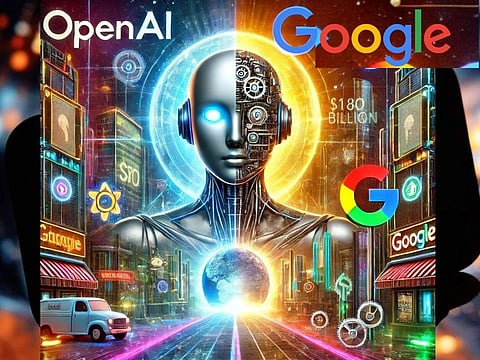War over web: Will OpenAI steamroll Google’s throne?
Free real-time search capability makes ChatGPT a direct competitor to Google’s dominance

What do you get from doing a ChatGPT search?
Up-to-date results, but with no ads. That's the anti-Google jaggernaut open OpenAI has unleashed, at least for now.
Google remains dominant for traditional searches. But AI tools like ChatGPT, powered by the so-called large language models (LLMs) and ultra-high speed computing, are redefining how people interact with information.
Search-engine war heats up
On Monday (December 16), San Francisco-based OpenAI announced that its internet search feature powered by ChatGPT will now be available to all users globally, both free and paid.
Will ChatGPT steamroll Google's highly-coveted territory of multi-trillion dollar ads-driven revenue business model?
It's early days.
Google: A tough nut to crack
And even if it does, perhaps not immediately. While AI-driven search like ChatGPT challenges traditional methods, Google's robust infrastructure, massive ad network, and years of dominance make it resilient.
However, long-term disruption is possible if OpenAI and similar players redefine how information is monetized and delivered.
Google (parent company: Alphabet) currently has a market capitalisation of $2.42 trillion as of Monday (December 16, 2024).
If OpenAI cracks a new AI-driven, ads-sustainable business model, it could force Google to rethink its entire approach.
Ultimately, it will come down to user preference — whether people prefer AI-generated answers over Google's ad-supported search experience.
What happened before
Previously exclusive to ChatGPT Plus subscribers, this upgrade brings real-time web searches to hundreds of millions of users, marking a significant challenge to Google’s search dominance.
The feature, launched in late October, allows users to access “fast, timely answers” supplemented with links to relevant web sources, eliminating the need to toggle between ChatGPT and traditional search engines.
What OpenAI said
“We’re bringing search to all logged-in free users of ChatGPT,” said Kevin Weil, OpenAI’s Chief Product Officer, in a YouTube video. “It’ll be available globally across every platform where ChatGPT is used.”
How It Works
Unlike Google’s ad-heavy results, ChatGPT’s interface offers a clean, conversational experience, similar to AI-powered search platforms like Perplexity. It provides answers alongside source citations, enhancing transparency and reliability. Users can activate this feature via a web search icon within ChatGPT or enable it by default.
Up-to-date results
Adam Fry, ChatGPT’s Search Product Lead, emphasised the importance of up-to-date results. “We’re really just improving the ChatGPT experience with current web information,” he explained.
This addresses a key limitation faced by AI models like ChatGPT and Claude, which rely on data cutoffs and lack access to real-time information.
Google and Microsoft’s AI-powered tools already integrate live search results with AI-generated answers, and this move aligns OpenAI more closely with their offerings.
3 ways ChatGPT poses competition to Google:
• Conversational search experience: ChatGPT offers a more interactive and personalised search experience. Instead of sifting through multiple links, users receive direct, human-like answers tailored to their queries, reducing time spent finding information. • Content generation: While Google connects users to resources, ChatGPT creates content. From writing articles, summarising topics, to drafting emails or code, ChatGPT's generative capabilities provide actionable solutions immediately. • Task automation: ChatGPT can perform tasks like brainstorming ideas, analyzing data, or coding assistance— roles that typically require additional tools or detailed manual searches on Google.
Impact
This update underscores OpenAI’s ambitions to position itself as a major player in internet search, challenging Google’s near-monopoly and Microsoft’s Bing.
According to a Reuters report, the global search engine market is valued at $180 billion and heavily driven by advertising—a business model that OpenAI appears to sidestep with its minimalist design.
However, the rollout comes with a cost.
Computing needs
Scaling real-time web searches to hundreds of millions of users will dramatically increase OpenAI’s computing needs and operational expenses.
CEO Sam Altman recently led OpenAI to a $157 billion valuation, supported by major investors like Microsoft, SoftBank, and Nvidia, all of whom stand to benefit from OpenAI’s growing market share.
Broader implications
Experts predict this move could reshape the search engine landscape. Dr. Paul Clements, a tech industry analyst, said:
“OpenAI’s integration of search into ChatGPT combines the convenience of conversational AI with live web data. Google may face serious pressure to innovate beyond its ad-dependent model.”
What users can expect
While OpenAI refrains from launching a separate search product, this integration highlights its ability to blend generative AI with live internet data, offering a seamless alternative to search engines like Google.
As competition intensifies, one thing is clear: the way we search for information on the internet is evolving—and OpenAI is leading the charge.
(With inputs from AFP, Reuters)



